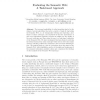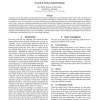82 search results - page 15 / 17 » Knowledge Sources for Word Sense Disambiguation |
ECML
2003
Springer
14 years 1 months ago
2003
Springer
Comparative machine learning experiments have become an important methodology in empirical approaches to natural language processing (i) to investigate which machine learning algor...
TASLP
2010
13 years 2 months ago
2010
To solve the knowledge bottleneck problem, active learning has been widely used for its ability to automatically select the most informative unlabeled examples for human annotation...
SEMWEB
2007
Springer
14 years 1 months ago
2007
Springer
The increased availability of online knowledge has led to the design of several algorithms that solve a variety of tasks by harvesting the Semantic Web, i.e., by dynamically select...
LREC
2010
13 years 9 months ago
2010
In the paper we investigate the impact of data size on a Word Sense Disambiguation task (WSD). We question the assumption that the knowledge acquisition bottleneck, which is known...
LREC
2010
13 years 9 months ago
2010
Language users are increasingly turning to electronic resources to address their lexical information needs, due to their convenience and their ability to simultaneously capture di...


